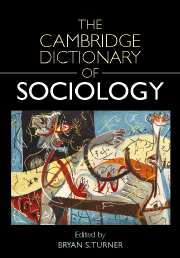E
Published online by Cambridge University Press: 22 October 2021
Summary
economism
This is a term for theories that regard economic activity as the primary focus of social life, in which political or cultural arrangements are, at best, secondary to, or derivative of, more fundamental economic forces. Examples of economism include theories (such as the economics of the market, and certain types of Marxism) and social activities (such as free trade or trade unionism) that are perceived as neglectful of interactions between economic and noneconomic aspects of social life.
The term is usually applied by critics rather than supporters of economism. To describe something or someone as economistic is usually to diagnose a one-dimensional approach to social analysis that is inadequate to the complex or multidimensional character of social phenomena. Few sociologists would identify with economism in an extreme form, even though many would regard the economy as a central (perhaps the central) aspect of social structure, power, and social inequality.
The idea of economism rests on the modern assumption of a social differentiation. This perspective sees society as becoming differentiated into distinct spheres – the economy, government, law, and culture – that are autonomous from one another and centered on specialized institutions – such as markets and factories, parliaments and law courts, and so forth. The idea of differentiation, however, raises questions as to the relationship between different spheres, in this case between the economy and the rest of society. While economistic thinking sees this in terms of the causal primacy of the economy over polity and culture, this assumption remains controversial. Sociologists generally prefer alternative accounts which emphasize the role of government and culture in the constitution and regulation of economic life. ROBERT HOLTON
economy
In the most simple and general sense, the concept of the economy is used to refer to the social organizations and institutions that are involved in the production and distribution of goods and services in society – firms, labor, money-capital, and the markets and networks by which they are connected and articulated. The term is derived from the ancient Greek oeconomicus which referred to the practical activity of household (oikos) management.
- Type
- Chapter
- Information
- The Cambridge Dictionary of Sociology , pp. 157 - 187Publisher: Cambridge University PressPrint publication year: 2006



